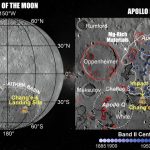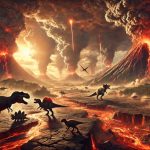Earth & Environment
How long do civilizations last
It is one of the most famous questions in science, and it was asked, as legend has it, over lunch.
Enrico Fermi, the physicist who...
Why your dog tries to help and your cat just watches
If you’ve ever lost something at home, you may have noticed a funny difference between your pets.
Your dog might rush over, sniff around, and...
How a 600-million-year-old one-eyed creature shaped human sight
Long before humans, dinosaurs, or even fish existed, one of our distant ancestors looked very different from anything alive today.
Researchers now say that all...
Ancient amber reveals how ants lived and interacted in the age of dinosaurs
Tiny insects trapped in fossilized tree resin are offering scientists a rare window into life on Earth millions of years ago.
A new study of...
6 million years ago something slammed into modern-day Brazil
Giant impacts on Earth's surface can be cataclysmic events with far-reaching consequences. They can excavate massive craters like the Vredefort Crater.
There's also growing evidence...
Your tires may be broadcasting your movements without you knowing
A safety feature found in most modern cars could also be quietly exposing drivers to tracking, according to new research from the IMDEA Networks...
Ancient love stories: How Neanderthal–human relationships shaped our DNA
Our DNA carries the history of ancient migrations, encounters, and relationships between different human groups.
A new study suggests that intimate connections between modern humans...
Why complaining about your boss might actually bring coworkers closer
Most people have done it at least once—venting to coworkers about a frustrating boss after a long meeting or a tough day.
Gossiping about the...
Ancient eggshell engravings reveal early humans’ surprising math skills
More than 60,000 years ago, early humans in southern Africa were carving patterns onto ostrich eggshells—and new research shows these designs were far more...
Scientists find one of the smallest dinosaurs ever found in South America
Scientists have discovered a remarkably complete fossil of a tiny dinosaur that is helping to solve a long-standing puzzle about a strange group of...
Iron age mass grave reveals targeted killing of women and children in Europe
Archaeologists have uncovered chilling evidence of a large-scale massacre from about 2,800 years ago in what is now northern Serbia.
The discovery, made at the...
Breathing dirty air may quietly raise Alzheimer’s risk in older people
Alzheimer’s disease is the most common form of dementia and affects tens of millions of people around the world. It slowly damages memory, thinking...
FEATURED
Why are we obsessed with crime stories?
The lines between pop culture and criminal justice blur in our fascination with the unlawful.
Nothing makes for an engaging narrative arc quite like murder.
As...
Scientists uncover hidden magma activity at Chang’e-6 lunar landing site
Scientists have made an exciting discovery at the landing site of China’s Chang'e-6 mission on the moon's farside.
The mission, which is part of the...
Scientists discover new tardigrade fossil in 16-million-year-old amber
Tardigrades, also known as water bears, are a diverse group of charismatic microscopic invertebrates that are best known for their ability to survive extreme...
Make neighborhoods green for heart health? The idea is taking root
Neighborhoods filled with trees, grass and other flora not only improve the air and clear the mind – they also can reduce heart disease...
Volcanic eruptions did not wipe out dinosaurs, scientists confirm
For years, scientists have debated whether massive volcanic eruptions or a meteorite impact caused the extinction of dinosaurs 66 million years ago.
New research from...
How plant-eating dinosaurs handle tough diets
At the end of the Cretaceous period, duck-billed dinosaurs, known as hadrosaurs, were some of the most advanced plant-eaters on Earth.
New research has revealed...
Sunflower family tree shows flowers’ symmetry came from multiple origins
In the vast and vibrant world of plants, the sunflower family stands out for its sheer diversity, including beloved blossoms like asters, daisies, and...
Scientist find snow monkeys go fishing to survive harsh winters
Snow monkeys living in one of the world’s coldest regions survive by ‘going fishing’ – scooping live animals, including brown trout, out of Japanese...
























